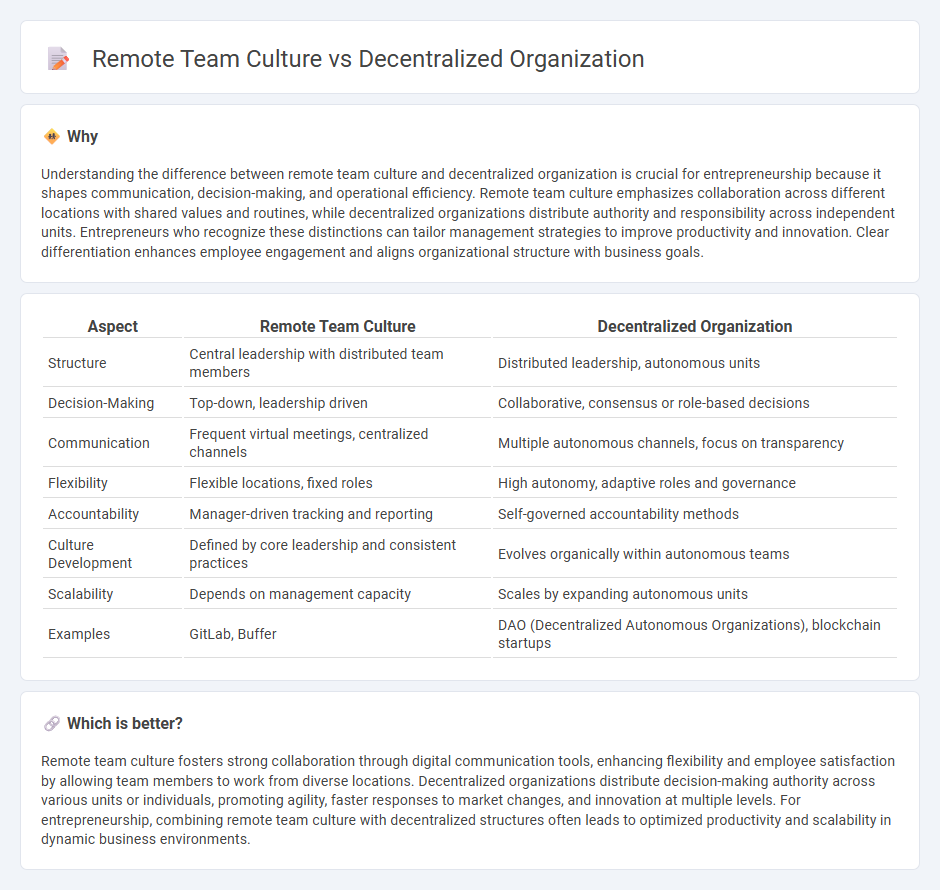
Entrepreneurship thrives in both remote team cultures and decentralized organizations, where flexibility and autonomy drive innovation and productivity. Remote teams leverage digital tools to collaborate seamlessly across geographies, while decentralized organizations distribute decision-making power to empower employees at every level. Explore how these dynamic models transform business agility and growth.
Why it is important
Understanding the difference between remote team culture and decentralized organization is crucial for entrepreneurship because it shapes communication, decision-making, and operational efficiency. Remote team culture emphasizes collaboration across different locations with shared values and routines, while decentralized organizations distribute authority and responsibility across independent units. Entrepreneurs who recognize these distinctions can tailor management strategies to improve productivity and innovation. Clear differentiation enhances employee engagement and aligns organizational structure with business goals.
Comparison Table
| Aspect | Remote Team Culture | Decentralized Organization |
|---|---|---|
| Structure | Central leadership with distributed team members | Distributed leadership, autonomous units |
| Decision-Making | Top-down, leadership driven | Collaborative, consensus or role-based decisions |
| Communication | Frequent virtual meetings, centralized channels | Multiple autonomous channels, focus on transparency |
| Flexibility | Flexible locations, fixed roles | High autonomy, adaptive roles and governance |
| Accountability | Manager-driven tracking and reporting | Self-governed accountability methods |
| Culture Development | Defined by core leadership and consistent practices | Evolves organically within autonomous teams |
| Scalability | Depends on management capacity | Scales by expanding autonomous units |
| Examples | GitLab, Buffer | DAO (Decentralized Autonomous Organizations), blockchain startups |
Which is better?
Remote team culture fosters strong collaboration through digital communication tools, enhancing flexibility and employee satisfaction by allowing team members to work from diverse locations. Decentralized organizations distribute decision-making authority across various units or individuals, promoting agility, faster responses to market changes, and innovation at multiple levels. For entrepreneurship, combining remote team culture with decentralized structures often leads to optimized productivity and scalability in dynamic business environments.
Connection
Remote team culture thrives on trust, clear communication, and autonomy, essential elements that support decentralized organizations by empowering employees to make decisions independently. Decentralized organizations leverage distributed leadership and reduced hierarchical constraints, which align with remote teams' need for flexibility and self-management. This synergy enhances innovation, responsiveness, and scalability in entrepreneurial ventures operating in diverse geographic locations.
Key Terms
Autonomy
Decentralized organizations prioritize autonomy by distributing decision-making power across various levels, empowering employees to take initiative without waiting for central approval. Remote team cultures also emphasize autonomy but rely more heavily on trust and clear communication to manage independent work across geographic boundaries. Explore how autonomy shapes efficiency and innovation in both decentralized and remote work environments.
Communication
Decentralized organizations rely on distributed decision-making processes that empower teams with autonomy, fostering open and transparent communication channels across various nodes. Remote team culture emphasizes synchronous and asynchronous communication tools such as Slack, Zoom, and project management platforms to maintain engagement, accountability, and collaboration despite physical distances. Explore how tailored communication strategies enhance productivity and cohesion in both decentralized and remote work environments.
Decision-making
Decentralized organizations distribute decision-making authority across multiple levels, empowering teams and individuals to act autonomously, which enhances agility and responsiveness. Remote team cultures emphasize clear communication protocols and shared leadership practices to maintain alignment despite physical distance. Explore how integrating decentralized decision-making with remote work dynamics can optimize organizational performance and innovation.
Source and External Links
What Is a Decentralized Organizational Structure? | HR Glossary - In a decentralized organization, decision-making authority is distributed across multiple levels, allowing managers and teams to make key decisions without top-level approval.
Decentralized Organization Definition, Structure & Example - Lesson - Mid- and lower-level managers in a decentralized organization have significant authority to make and execute decisions while upper management focuses on long-term strategy.
Everything You Need to Know About Decentralized Organizations - Decentralized organizations empower frontline teams with decision-making power, resulting in fewer management layers and faster, more adaptable responses.
 dowidth.com
dowidth.com